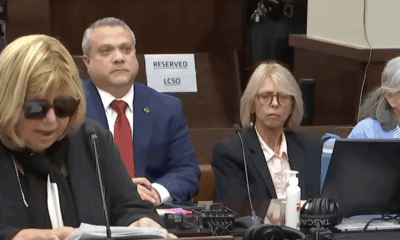Science
Embracing Micro-Relationships: The Power of Talking to Strangers

VANCOUVER – A growing movement advocates for the significance of brief interactions with strangers, emphasizing their positive impact on mental health and community belonging. This initiative is championed by psychology professor Gillian Sandstrom, whose personal experience sparked her research into the value of micro-relationships.
Years ago, while she was a graduate student in Toronto, Sandstrom formed a connection with a woman who operated a hotdog stand. Their small exchanges, which she describes as “a tiny, tiny micro-relationship,” offered her a sense of belonging and comfort during a lonely period in her life. “It made me feel woven into the fabric of my community,” she explained, underscoring the importance of these seemingly trivial interactions.
Sandstrom now serves as an associate professor at the University of Sussex in England and advocates for the benefits of engaging with strangers. This perspective aligns with the mission of the Toronto-based organization GenWell, which aims to foster social connections. GenWell is promoting its upcoming national Talk to a Stranger Week, scheduled for November 24-30, 2025, as a way to encourage individuals to initiate conversations with unfamiliar faces.
Pete Bombaci, CEO of GenWell, stated that the initiative aims to provide people with “an excuse” to engage with others. The organization believes that even brief interactions can lead to long-term, meaningful relationships that enhance individual happiness and overall societal well-being. “We want to help people build connections that create a better society,” he added.
Research conducted by GenWell indicates a correlation between happiness and the frequency of greetings exchanged with neighbors and strangers. In a 2021 survey involving approximately 2,500 respondents, participants who greeted others daily reported higher levels of happiness compared to those who did so less frequently.
Among those who have embraced the concept of talking to strangers is Tony Esteves, from Canmore, Alberta. After struggling with depression in 2016, Esteves set a goal to converse with at least one new person each day. He attributes this challenge to a profound transformation in his life, enhancing his empathy and listening skills. “Meeting strangers literally saved my life,” he remarked, recalling significant connections made during his journey.
Esteves recounted his experiences, including speaking with a musician who later became a collaborator in co-hosting a music festival. He also formed an eight-year romantic relationship with a woman he met at a concert. “I will forever be grateful for the journey we shared,” he reflected.
The importance of social connections has drawn the attention of public health officials. Ian Culbert, executive director of the Canadian Public Health Association, emphasized that the need for connectivity has long been recognized in public health discussions. He cited recent data from Statistics Canada, revealing that over 13 percent of surveyed Canadians reported feeling lonely “always or often.”
Culbert explained that social interactions can alleviate loneliness and foster a sense of belonging. He noted, “These small encounters can improve mood, lower stress, and enhance resilience.” He referenced a 2014 study published in the National Library of Medicine, which found that social interactions, even within religious contexts, contribute to health benefits that extend beyond spiritual aspects.
Despite the benefits of engaging with strangers, many Canadians face barriers due to societal perceptions of risk. Research has indicated that concerns about “stranger danger” may hinder outdoor play for children and reduce adult interactions. A study published in the journal BMC Public Health suggested that tailored interventions could help reframe parents’ perceptions of risk associated with strangers.
Sandstrom’s own research, published in 2020, analyzed over 2,300 participants and concluded that individuals often limit interactions with strangers out of fear of rejection. Her findings suggest that social relationships are the most significant predictor of well-being, and while strong ties with family and friends are crucial, interactions with strangers also hold intrinsic value.
She described the act of engaging with strangers as a skill that requires practice, noting that technology often facilitates avoidance of such interactions. Sandstrom remarked, “We tend to like the person we talk to, but we believe they didn’t like us, which is just not true.” This phenomenon is what she terms the “liking gap.”
Esteves emphasized the importance of “micro-bravery” in fostering social connections, encouraging people to make small gestures, such as smiling or making eye contact. “These little acts build momentum and open doors to transformation,” he said.
As The Canadian Press consulted individuals in Vancouver, responses varied. Some, like self-proclaimed extrovert Mack Yong, expressed a natural inclination to connect with others. Yong stated, “It’s no fun to be lonely,” highlighting his enjoyment in learning from different perspectives during conversations, especially while traveling.
On the other hand, Julia Jacobs observed a generational divide regarding social interactions. She attributed her son’s reluctance to engage with strangers to the prevalence of technology, which has shifted communication styles towards digital platforms.
Bombaci acknowledged the increased disconnection in modern society, attributing it to technological reliance. Sandstrom concurred, noting that while loneliness is pervasive today, expanding social connections can also serve as an act of kindness. “Talking with strangers helps them feel connected,” she said, encouraging those hesitant to reach out.
The upcoming Talk to a Stranger Week serves as a reminder of the potential benefits of engaging with others in our communities. By fostering micro-relationships, individuals can contribute to a more connected and healthier society.
-

 World2 months ago
World2 months agoScientists Unearth Ancient Antarctic Ice to Unlock Climate Secrets
-

 Entertainment2 months ago
Entertainment2 months agoTrump and McCormick to Announce $70 Billion Energy Investments
-

 Lifestyle2 months ago
Lifestyle2 months agoTransLink Launches Food Truck Program to Boost Revenue in Vancouver
-

 Science2 months ago
Science2 months agoFour Astronauts Return to Earth After International Space Station Mission
-

 Technology3 weeks ago
Technology3 weeks agoApple Notes Enhances Functionality with Markdown Support in macOS 26
-

 Sports2 months ago
Sports2 months agoSearch Underway for Missing Hunter Amid Hokkaido Bear Emergency
-

 Politics1 month ago
Politics1 month agoUkrainian Tennis Star Elina Svitolina Faces Death Threats Online
-

 Technology2 months ago
Technology2 months agoFrosthaven Launches Early Access on July 31, 2025
-

 Politics2 months ago
Politics2 months agoCarney Engages First Nations Leaders at Development Law Summit
-

 Entertainment2 months ago
Entertainment2 months agoCalgary Theatre Troupe Revives Magic at Winnipeg Fringe Festival
-

 Entertainment1 month ago
Entertainment1 month agoLeon Draisaitl Marries Celeste Desjardins in Lavish Ceremony
-

 Entertainment2 months ago
Entertainment2 months agoBINI Secures Five Nominations at 2025 Jupiter Music Awards




















